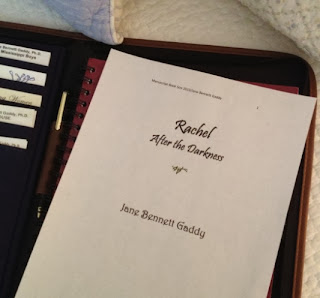Freefall
 She made a fresh pot of coffee and treated herself to a warmed-over fried peach pie, a momentary distraction from what she intended to do. From what she wanted to do. Traipsing across the creaky old wood floor of the kitchen, she inspected a detailed job of cleaning that had added to the delay. Then with courage intact, she took her pastry to the window seat, slipped her shoes off, and sat in her favorite place with stocking'd feet propped on the cushions. No longer stalling, she sucked in a deep breath and exhaled, ready to begin a long journey of some sort.
She made a fresh pot of coffee and treated herself to a warmed-over fried peach pie, a momentary distraction from what she intended to do. From what she wanted to do. Traipsing across the creaky old wood floor of the kitchen, she inspected a detailed job of cleaning that had added to the delay. Then with courage intact, she took her pastry to the window seat, slipped her shoes off, and sat in her favorite place with stocking'd feet propped on the cushions. No longer stalling, she sucked in a deep breath and exhaled, ready to begin a long journey of some sort. Rachel Payne was not sure where this exercise was going to lead, but she would read first and write after she had absorbed.
It was cold outside, the sun cheerfully cutting rays across the frosty window where she sat. Rachel breathed a prayer of thanks for the beauty of the day, for God's provision, and now for Sam's delight in getting to attend Sarepta School. Thomas would be proud of his youngest, the last son left at home. Rachel was now able to think about her husband without shedding tears. It felt good; it did not mean she loved him one whit less or that she did not miss his presence even more, but time had swept her beyond unbearable grief and heartache, leaving her with the same indefinable love and devotion for Thomas. It was liberating and she had no guilt. Thomas would approve of that.
An hour later, realizing the magnitude of her project, Rachel moved out of the window seat to the mahogany table in the great room of the old farmhouse. It was a beautiful piece of furniture her mother had given her and Thomas years ago. As she folded the old and fragile lace cloth and laid it aside, she declared this place to be her office.
By middle of the afternoon, Rachel leaned back in her chair, laid the copy of The Lexington Gazette across her breast, and sighed. These years since the war, she had only scratched the surface of information. Until now, she had no idea the extent of what had been written. With a freshly sharpened pencil and a tablet from her Christmas box, she, in a manner of speaking, broke the silence that permeated the old farmhouse, silence that hung as thick and low as fog over the bloody pond of Shiloh, for she was alone for the first time in many years. Her thoughts tumbled in freefall and she began to write words in response to what she was reading about the ugliness of human experience, the darkest days in the history of the South, reveling in the sound of the pencil swishing across the pages of her tablet. Rachel was about to become an active participant in exposing the vileness of an era that had produced more corruption than she cared to admit as a human being, a reality she was seeing for the first time as morally repulsive.
She read the words on her tablet. They were not hers, but there would be plenty of time for her own commentary. "Now is the critical time. The rebellion has not ceased; it has only changed its weapons. Once it fought; now it intrigues. Once it followed Lee in arms; now it follows Johnson in guile and chicanery." Wendell Phillips, Orator, Abolitionist, Attorney.
. . . The last thing Rachel wanted was to become incensed. She was trying to be unbiased, but, in this moment, her thoughts were to protect the memory of General Robert E. Lee. She felt it strange and almost irreverent to be reading this long string of harassing questions directed at probably the most noble and gracious man alive during the war years, for he had died just last year, his death having seriously affected her and her boys.
It was Lee's answers at the Congressional Hearing on Reconstruction that had triggered Wendell Phillips' gratuitous remarks. As Rachel read the transcript of the hearing, she became aware of true nobility, and it was not the three Senators who questioned him like he was a common criminal. They—Senators Howard of Michigan, Conkling of New York, and Blow of Missouri—had tried their hardest to trick Lee with his own words, but he would not yield. He walked away with his integrity intact, though drained of all hope that the Radicals would ever understand the South. As far as Rachel was concerned, Lee was still—and more so than ever—the real hero.
Excerpts from RACHEL, AFTER THE DARKNESS
Chapter 9—Freefall
Planned for publication in early 2014
Jane Bennett Gaddy
Trinity, FL



Comments
Post a Comment